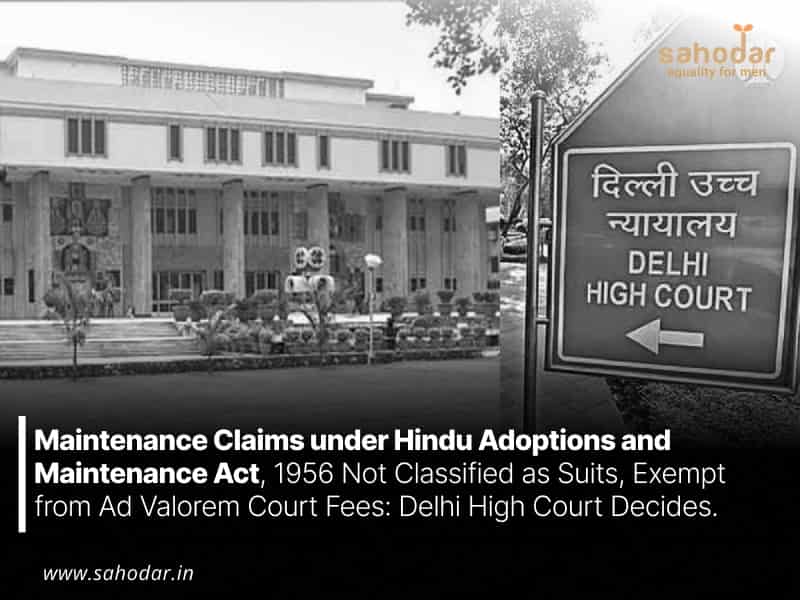“The Family Courts Act, 1984 was enacted pursuant to the 59th Report of the Law Commission wherein it was stressed that in dealing with the disputes concerning the family, the family court should adopt an approach radically different from that adopted in ordinary civil proceedings.”
The Delhi High Court recently issued a significant ruling regarding court fees in maintenance cases governed by the Hindu Adoptions and Maintenance Act, 1956 (HAMA). In this case, an appeal was filed against an order issued on February 22, 2020, by the Family Court, which had directed one of the appellants to pay ad valorem court fees based on the claimed amount. The case was presided over by a Division Bench consisting of Justice Sanjeev Sachdeva and Justice Vikas Mahajan.
The central issue revolved around whether the ad valorem court fees should be applied to maintenance claims made under Sections 18 and 20 of HAMA. The appellants included the wife of the respondent (Appellant 1) and the son of the respondent (Appellant 2), who had initiated the legal proceedings under the aforementioned sections of HAMA.
The Delhi High Court determined that proceedings under Sections 18 and 20 of HAMA should not be classified as traditional lawsuits. Instead, they should be considered as unique legal proceedings, and therefore, ad valorem court fees were not applicable. This decision led to the overturning of the previous order issued on February 22, 2020, which had mandated ad valorem court fees.
The Court emphasized that Family Courts, once established by the State Government, hold exclusive jurisdiction over all matters related to maintenance, whether under HAMA, the Hindu Marriage Act, 1955 (HM Act), the Criminal Procedure Code, 1973 (CrPC), or other relevant statutes. This particular case had its origins in the Family Court, and it was noted that a Hindu wife could assert her maintenance claim under different sections of various laws.
The Court further explained that requiring different fee structures for maintenance claims depending on the applicable law would be inequitable and unreasonable. Thus, it was decided that uniformity in court fees was warranted. The Court referred to previous legal cases, such as the “Mamta v. Hari Kishan” case and the “Balwinder Singh v. Sinderpal Kaur” case, which had similarly ruled that Family Court proceedings should not be classified as traditional lawsuits, and ad valorem court fees should not apply.
In the end, the Delhi High Court concluded that the Family Court had erred in its interpretation, and the established precedent should be followed. As a result, the maintenance proceedings under HAMA were not subject to ad valorem court fees, ensuring consistency in legal procedures and fees for maintenance claims.
The Court opined that “in Mamta case (supra) and Balwinder Singh case (supra) the ratio is that the object of the Family Courts Act, 1984 was to set up a forum for settlement of family disputes with due emphasis on conciliation and achieving socially desirable results and further to eliminate the rigid rules of procedure and evidence.”
The Court held that the enactment of the Family Courts Act, 1984 (‘the FC Act’) was a legislative response to the recommendations articulated in the 59th Report of the Law Commission. The primary intent behind the FC Act was the simplification of evidentiary and procedural norms within the ambit of family law, with a view to enhancing the efficacy of Family Courts.
In alignment with this legal perspective, the Court invoked the judicial precedents of Karbhari Vithoba v. Anusuya Karbhari 1956 SCC OnLine Bom 97 and Srikant Chand v. Mt. Ram Mohini 1957 SCC OnLine Pat 234. The Court, in its judicial wisdom, pronounced that proceedings governed by Sections 18 and 20 of the Hindu Adoption and Maintenance Act (HAMA) do not attain the character of conventional suits. Rather, they qualify as unique proceedings to which a prescribed fixed court fee of Re. 1.25p is applicable, thereby exempting them from ad valorem court fee assessment.
Consequently, the Court, exercising its adjudicatory authority, annulled the order dated 22-02-2020.

